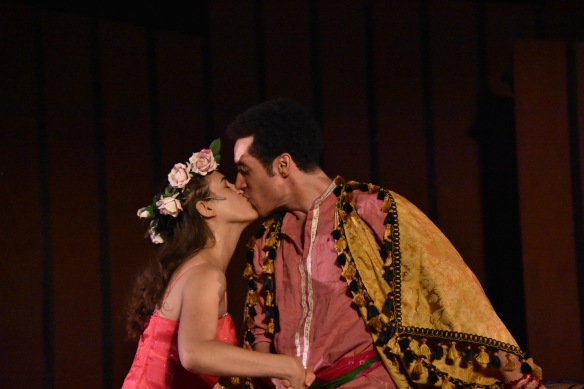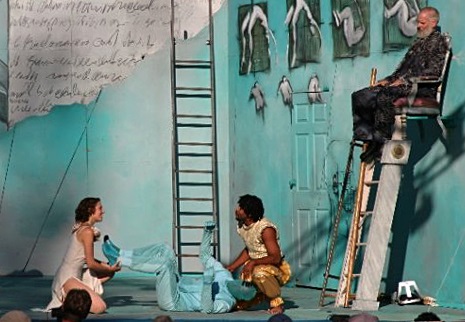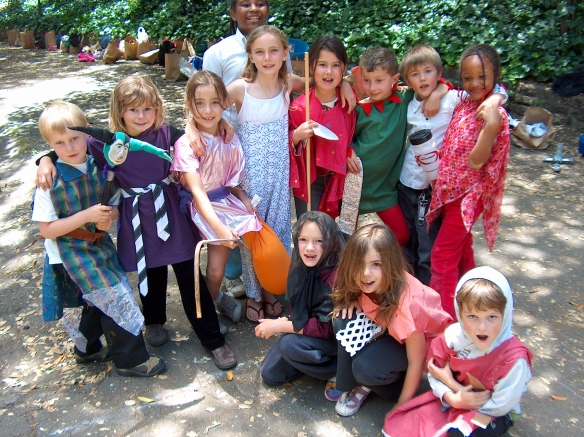Romeo and Juliet get a lot of love (pun intended) every February. As do Beatrice and Benedick. And Viola and Orsino. And Rosalind and Orlando. And the young lovers of A Midsummer Night’s Dream. Even Antony and Cleopatra turn up on Shakespearean valentines everywhere.
But there are plenty of lesser-known couples in Shakespeare–many of whom actually wind up together, and ALIVE, at the end of the play! According to arbitrary rigorous criteria of cuteness, we’ve listed our top seven “happy ending” Shakespearean couples below whom we wish were more famous.
7. Valentine and Sylvia, The Two Gentlemen of Verona
“What light is light, if Silvia be not seen?
What joy is joy, if Silvia be not by?”

Michael Navarra and Emily Jordan as Valentine and Sylvia in the 2010 SF Shakes production.
If you ignore the last five minutes of the play, when Valentine considers giving Sylvia to his best friend because, you know, bros before [girls], these two are painfully adorable together.
6. Imogen and Posthumus, Cymbeline
“I shall here abide the hourly shot
Of angry eyes, not comforted to live,
But that there is this jewel in the world
That I may see again.”

Craig Marker and Emily Jordan as Posthumus and Imogen in the 2011 SF Shakes production.
Imogen, the daughter of a king, is willing to give up her hopes for the crown to marry her beloved Posthumus behind her father’s back. Sure, there’s that section of the play when Posthumus is tricked into believing that Imogen has been unfaithful, and tries to have her killed while railing on women as a whole, but…everything turns out well and they’re reunited in the end so that’s okay, right?
5. Anne Page and Fenton, The Merry Wives of Windsor
“‘Tis the very riches of thyself that now I aim at.”

2010 Shakespeare’s Globe production. Source: crouchinggiraffe.blogspot.com
A good counterpoint to Romeo and Juliet, these two crafty young people secretly get married against parental wishes and actually live to tell the tale!
4. Portia and Bassanio, The Merchant of Venice
“One half of me is yours, the other half yours,
Mine own, I would say; but if mine, then yours,
And so all yours.”

2004 film version. Source: redemptiosehnsucht.blogspot.com
Sure, Bassanio originally woos Portia for money, and he’s really not the brightest crayon in the box. But when Portia begs him not to undergo the test for her hand in marriage (and risk losing the test), it’s just adorable.
3. Pericles and Thaisa, Pericles
“To me he seems like diamond to glass.”

Michael Storm and (yes, again) Emily Jordan as Pericles and Thaisa in 2008 SF Shakes production.
These two have a relationship that survives decades, not to mention Thaisa supposedly dying and being pushed out to sea in a casket in the middle of a crazy storm, for goodness’ sake. Now THAT’S true love.
2. Perdita and Florizel, The Winter’s Tale
“I cannot be mine own, nor any thing to any, if I be not thine.”

Rosie Mallett and Davern Wright as Perdita and Florizel in 2016 SF Shakes production.
Florizel’s dedication to Perdita, even after his furious father disowns him as a prince in punishment, is wonderful. It’s also a rare thing for a Shakespeare play to show a nobleman remaining truthful to a lower-class woman (whereas noble women remain true to penniless men all the time). The fact that Perdita’s secretly a princess ultimately makes The Winter’s Tale part of this trend, but Florizel doesn’t know she’s a princess when he gives up everything to run away with her.
1. Miranda and Ferdinand, The Tempest
“I would not wish any companion in the world but you.”

Julia Motyka and Daveed Diggs as Miranda and Ferdinand (with Julian Lopez-Morillas as Prospero) in the 2006 SF Shakes production.
How often in Shakespeare plays are two young lovers set up by a parent, only to acutally fall in love? Hardly ever, that’s how often. And seriously…these two are just the cutest. They win by a landslide.
What do you think? Did we leave out any lesser known, happy-ending lovers that you’d like to see on this list?







 Oy. It’s easy and it’s hard. There are so many great places in SF but not all of them work for this kind of thing. We have a huge spreadsheet going and we’re going to ask our audience for some of their favorite places as well. We feel strongly that there should be a synergy between the place and the speech and that’s a matter of gut instinct.
Oy. It’s easy and it’s hard. There are so many great places in SF but not all of them work for this kind of thing. We have a huge spreadsheet going and we’re going to ask our audience for some of their favorite places as well. We feel strongly that there should be a synergy between the place and the speech and that’s a matter of gut instinct.




